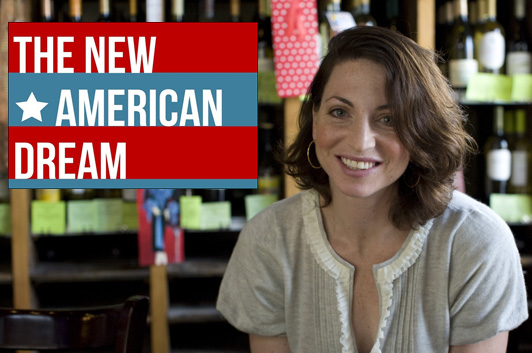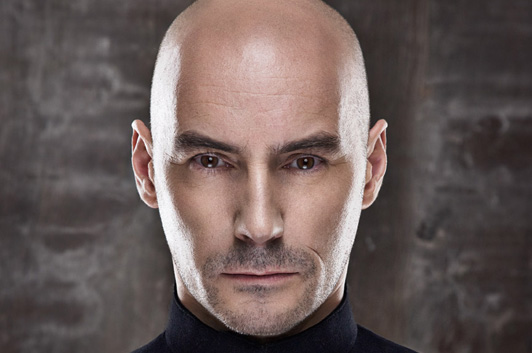Penelope Trunk’s Farewell to Publishing

photo: PenelopeTrunk.com
When Penelope Trunk decided to release her latest book, The New American Dream, through an independent, digital-only publishing company called Hyperink (“working directly with domain experts to publish beautiful, high-quality eBooks”), there was a lot of talk—but it wasn’t about the book or its contents. Instead, it was about a blog post Trunk wrote about her very bad breakup with Big Publishing, or rather with the big publisher that had originally given her an advance for this book. According to Trunk, it all fell apart when they started to talk about the marketing plans:
“Really, their call was just about giving me a list of what I was going to do to publicize the book. I asked them what they were going to do. They had no idea. Seriously. They did not have a written plan, or any list, and when I pushed one of the people on this first call to give me examples of what the publishers would do to promote my book, she said ‘newsgroups.’
“I assumed I was misunderstanding. I said, ‘You mean like newsgroups from the early 90s? Those newsgroups? USENET?'”
Conversations like this led Trunk to believe that she was better at online marketing than the people who were about to publish her book, and the presentation they put on to persuade her otherwise didn’t work. At some point during that meeting, she says, a “high-up guy” at the company told her, “If you don’t stop berating our publicity department we are not going to publish your book.†She called their bluff—and here I’m presuming that she had a really good contract with a clause stipulating that if she delivered a manuscript that they considered publishable, and then later decided not to publish, she could keep her advance. So she walked.
There’s been a lot of conversation around Trunk’s revelations. TechCrunch believes the blog post is “calls bullshit on traditional publishing,” while Digital Book World wonders who that publisher could have been, and I saw a lot of people discussing the plausibility of her version of events on Twitter. And, because the listing for The New American Dream in Amazon.com’s Kindle Store says it’s only 53 pages long, there’s some question as to how what she’s selling now compares to the book that was sold to the publishing house, because would they really have agreed to publish something that short?
11 July 2012 | theory |
MorrisonCon and the Author Ecosystem

photo: Allan Amato
I started seeing reports a while back about MorrisonCon, a weekend-long event that’ll be taking place in Las Vegas at the end of September 2012. For $699 (plus fees and tax), a thousand fans will enjoy a program curated by Grant Morrison, who’s written some of the top characters at both Marvel and DC—right now, for example, he’s working on both Superman and Batman—as well as Supergods, a dizzying combination of pop cultural history, autobiography, and far-out mysticism. He’s also, according to the folks at Ignition Sequence, “the perfect combination of social scientist and creative catalyst to help us re-envision everything that a comic convention could be.” What he’s come up with, they continue, is “[a] jam-packed schedule of unique panels, symposiums, one-on-one signing sessions and late-night mixers,” where attendees will get to spend quality time with Morrison and a select handful of writers and artists whose work he enjoys, like Walking Dead creator Robert Kirkman and My Chemical Romance lead singer Gerard Way.
Over at the LA Times blog Hero Complex, the imminent event is described as “a TED Conference with a dash of Nocturnal Wonderland, The Bowery Poetry Club and, um, maybe a pentagram.” Which sounds about right. It’s all out of my budget at the moment, but it could be quite the show—and, if it goes well, I think it’s a strong scenario for one likely future of author events.
In the publishing and bookselling worlds, there’s been a lot of talk over the last few years about how the traditional bookstore event—where an author shows up, reads from his or her latest book, takes a few questions from the audience, signs books for the fans, and heads back to the hotel—just isn’t cutting it anymore. A lot of folks have worked on developing alternatives, including my own efforts at curating an “author/blogger” series for Brooklyn’s >Greenlight Bookstore and my collaborative efforts in the Lady Jane’s Salon for romance novelists. MorrisonCon is a natural evolution of shows like Amanda Stern’s Happy Ending, which puts authors and musicians together on the same stage, with a bit of that TED conference vibe mixed in—or, as I said when I first heard about the event, the same impulse that drives aspiring screenwriters to spend a weekend with Robert McKee.
10 July 2012 | theory |

 Our Endless and Proper Work is my new book with Belt Publishing about starting (and sticking to) a productive writing practice.
Our Endless and Proper Work is my new book with Belt Publishing about starting (and sticking to) a productive writing practice. 
